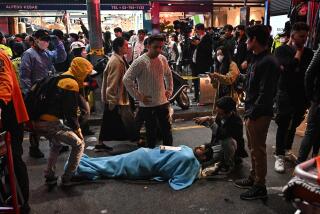U.S. journalists jailed in North Korea are expected to get prison terms
When North Korea detained two American TV journalists in March, accusing them of illegal entry and “hostile acts,” analysts believed the script would be familiar: The pair would be tried, convicted and soon released in exchange for U.S. concessions.
But after a nuclear test in the secretive state that was harshly criticized worldwide, experts say the women could be sentenced to long prison terms with little chance for negotiation.
Laura Ling and Euna Lee are set to stand trial Thursday in Pyongyang’s top Central Court, where few appeals are granted. Many say they face up to 15 years of hard labor.
“If I were these two women’s families, I’d be very worried,” said Marcus Noland, a senior fellow for the Peterson Institute for International Economics and a North Korea expert. “Even in the best-case scenario, North Korea sees these two as criminals who were presumably up to no good in a very serious way.
“They want to show their enemies that if people do things like this, illegally enter their country, they will pay a price. And the new tensions have raised the stakes even further.”
Ling and Lee were on assignment for San Francisco-based Current TV when they were captured by North Korean guards along the sensitive border region with China.
The xenophobic nation has demonstrated that it does not tolerate intruders. In 1996, an intoxicated American who swam naked across a river from China into North Korea was held for three months on espionage charges before his release was negotiated by then-Rep. Bill Richardson of New Mexico.
The Obama administration had sought to quietly negotiate with North Korea after the March 17 arrest of the journalists, analysts say. U.S. officials were encouraged after Iran released American journalist Roxana Saberi, who spent four months in jail on spy charges.
A Current TV spokesman declined to comment.
Family members have expressed concern for the two journalists. Lee has a 4-year-old daughter, and Ling suffers from an ulcer that may have worsened during her captivity.
“It has been nearly three months since their arrest,” their families said in a statement. “We have been holding our breath every day as we’ve watched the political situation on the Korean peninsula grow increasingly tense.”
They also pleaded to North Korea for clemency.
“Laura and Euna are journalists who were simply doing their job. We aren’t certain of the details of what happened on March 17, but we can say with absolute certainty that when the girls left U.S. soil, they never intended to set foot onto North Korean territory,” the families said in a statement.
Pyongyang’s official Korean Central News Agency has recently released condemnations of the women, alluding to their “confirmed crimes” and “illegally intruding into [North Korean] territory.”
Experts say the trial will serve as a political litmus test.
“If things in North Korea are not business as usual, the journalists could be there for a longer period of time,” said Scott Snyder, a North Korea analyst for the Asia Foundation.
Many say political uncertainty in North Korea could cast a pall over the trial. After suffering a debilitating stroke last year, strongman Kim Jong Il is reportedly looking to soon name a successor, rumored to be his youngest son.
The possible power vacuum has created a subtle battle of ideologies as communist hard-liners seek to crush those in favor of social reforms and a more open policy toward the West.
“In the political uncertainty of a post-Kim North Korea, most party members want to show how orthodox they are, how down with Kim’s policies they are. Anyone who wants a softer line is probably keeping their heads down and mouths shut,” Noland said.
Others say the women have some value to North Korea as political trump cards.
“The U.S. is probably going to have to send a high-level envoy to bring them back,” said David Hawk, a senior advisor for a group called the U.S. Committee for Human Rights in North Korea. “But now the price has gone up. . . . The North Koreans are going to expect the envoy to arrive with more in the way of conciliations.”
Kim Dong-han, a research professor in North Korean studies at Dongguk University in Seoul and an expert in North Korean law, said he did not expect the journalists’ trial, which could last a month or longer, to end with a long prison sentence.
“Extreme punishments are only applied to five crimes in North Korea, such as treason and some high-profile murders,” he said.
He said he expected a maximum two-year jail term if the pair were convicted of the lesser charge of illegal entry.
Diplomats say North Korea has an opportunity to distinguish the journalists’ case from the political realm and temper an international image further damaged by the nuclear test.
Donald Gregg, a former CIA operative and ambassador to South Korea, says Pyongyang has lost credibility with allies Russia and China.
“The next opportunity that the North Koreans have to send a signal to the outside world is through their treatment of the two American journalists,” he said.
“If they do as Iran recently did, they will send a signal that they still have not burned all their bridges to the outside world. If they do not, it will be a signal that the hard-liners are in control, and that they have truly painted themselves into a corner.”
--
Ju-min Park of The Times’ Seoul Bureau contributed to this report.
More to Read
Start your day right
Sign up for Essential California for news, features and recommendations from the L.A. Times and beyond in your inbox six days a week.
You may occasionally receive promotional content from the Los Angeles Times.







